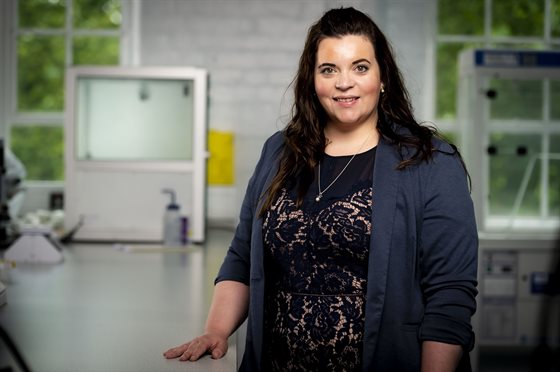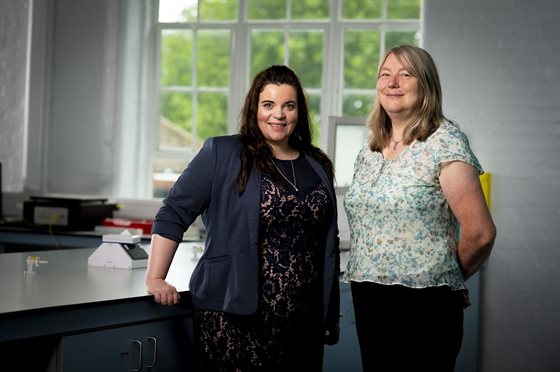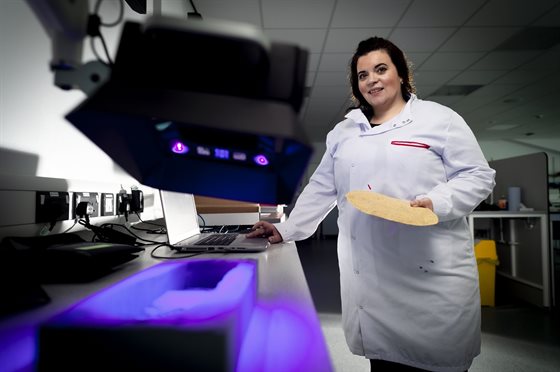Working on some of Britain’s most notorious major crime cases has helped a senior lecturer at De Montfort University Leicester (DMU) secure the most prestigious award for teaching and learning excellence available.
Forensic Science lecturer Leisa Nichols-Drew has been awarded a National Teaching Fellowship (NTF) by Advance HE, in recognition of her creative approach to training students how to take their investigations from crime scene to lab and on to court.

Senior lecturer Leisa has worked in forensic science for nearly 20 years
“I still can’t actually believe I am an NTF,” said Leisa. “The application was the most challenging experience – so much so, I cried with relief when I received the phone call from Advance HE! This peer-reviewed award is the highest accolade of lecturing and it is such an honour to represent DMU, as well as the field of forensic science, which I am very passionate about.
“I feel very lucky to be part of the forensic science team at DMU. I have such brilliant colleagues – I honestly work with some truly lovely people.
“I have had so much support from the School of Pharmacy and Faculty of Health and Life Sciences since I joined the university – especially from my mentor Professor Angela O’Sullivan, who is also an NTF. She has always encouraged me and I could not have achieved this without her motivational guidance throughout the process. She’s inspirational!”
The highly-competitive National Teaching Fellowship Scheme (NTFS) showcases the outstanding impact of individuals who teach or support learning in UK higher education, recognising their success and providing a platform to share the learning from their practice.

Leisa and her mentor, Professor Angela O'Sullivan, who is also an NTF
Leisa said: “I come from a practitioner background so I try and incorporate my own experiences of the UK Criminal Justice System into my lecturing as much as possible.”
Leisa replicates crime scenes and laboratory examinations that actually happened in the real world, to give the university’s undergraduates the experience of authenticity while equipping them with the skills to overcome the twists and turns that can arise in any fast-moving investigation.
She has also helped set up a #DMUglobal trip to New York which gives Forensic Science students the opportunity to learn more about the 9/11 tragedy – from crime scene to courtroom.
The students go on a tour of the Ground Zero memorial site with a survivor, before heading to the New York Medical Examiner – home to the largest DNA unit in the world and where the 9/11 investigations continue today. Finally, the trip is rounded off with a visit to New York’s Supreme Court.
Prior to joining DMU in January 2016, Leisa’s career started at the Home Office’s Forensic Science Service in 2000. She later worked as a trainer for the police, judiciary and Crown Prosecution Service to improve their forensic awareness.
During her time in practice, Leisa collected evidence which helped put several brutal murderers behind bars. She was part of the vehicle team that found crucial evidence, some as small as a grain of pollen, to help identify Soham murderer Ian Huntley, who killed 10-year-olds Holly Wells and Jessica Chapman in August 2002.
Forensic evidence found under a wheel-arch linked a countryside spot where the bodies were found to Huntley's car. Leisa recalls working meticulously on the vehicle with her colleagues for several days at an undisclosed location with blacked-out windows to keep its whereabouts secret from the world’s media.
She also worked on the forensic investigation for the so-called ‘Suffolk Strangler’ case which helped catch serial killer Steven Wright, who killed five women in Ipswich in 2006.
“All of my lectures relate to genuine cases that I have worked on,” said Leisa. “I’ve even staged and created my own CCTV footage for students to analyse during a case briefing. They love the fact that it is real as it can be!”
Students are not told the names of any victims or perpetrators in the scenarios as a mark of respect but also to ensure the students can’t use the internet to find out how the inquiries unfolded.

Leisa examines a cast of a footprint impression taken from soil
The Forensic Science course at DMU has facilities including a ‘Crime Scene House’ – to the unwitting, an innocuous terraced home in the city but behind the curtains it is host to bloody mocked-up crime scenes and a crashed vehicle.
“I absolutely love forensic science, I can’t think of anything else I would rather do,” said Leisa. “There is nothing better than sharing a subject you love with other people and being able to introduce the latest techniques or research for my students is exciting.”
In 2018, Leisa was honoured with a Churchill Fellowship, a scheme that provides successful applicants with funding to travel anywhere in the world to research a topic of their choice, to expand their personal and professional horizons and make a difference to communities.
Subsidised by the Winston Churchill Memorial Fund, Leisa travelled to Australia and Canada to investigate international responses to knife crime to assist the UK situation. Her findings were submitted to the House of Lords Forensic Science Enquiry and recently shared at a national knife crime conference facilitated by the All Party Parliamentary Group on Knife Crime. She is currently involved in publicising these research recommendations to assist the forensic examination of current cases, using novel technologies to prevent future injuries via a proposal to amend legislation and transform knife design.
RELATED NEWS
Forensic science expert to travel the globe to tackle knife crime
Double success for DMU lecturers in prestigious national teaching awards
Forensic Science students get access all areas in New York
Alison Johns, Advance HE’s chief executive, said: “Congratulations to all our 2019 winners. Creating ambassadors for innovative and impactful teaching who are valued by institutions and colleagues, and who can set in motion change and enhancements to make a really positive impact on student experience and outcomes across their institution and beyond.
“Advance HE looks forward to working with the winners to help to disseminate their work for the benefit of all.”
Dr Ben Calvert, Deputy Vice-Chancellor at the University of South Wales and Chair of the 2019 Teaching Excellence Awards Advisory Panel, said: “These awards really are the pinnacle of reward and recognition in teaching and learning.
“The 2019 winners are rightly proud of their achievements and I am sure they will continue to share their knowledge as individuals and teams so that their institutions, colleagues and the wider higher education sector can benefit from their expertise.”
Established in 2000, the NTFS is open to members of staff from all providers of higher education across the UK. In 2019, Advance HE expanded the scheme to include all four nations (England, Wales, Scotland and Northern Ireland), as well as Further Education Colleges.
This year, 54 individuals have been awarded National Teacher Fellowship status. They will receive their awards at a special ceremony taking place in Manchester in October.
Posted on Monday 5 August 2019